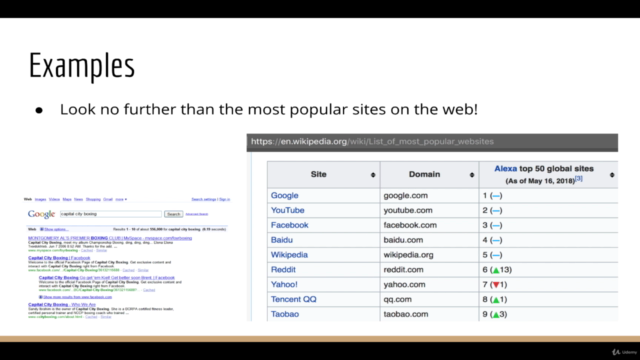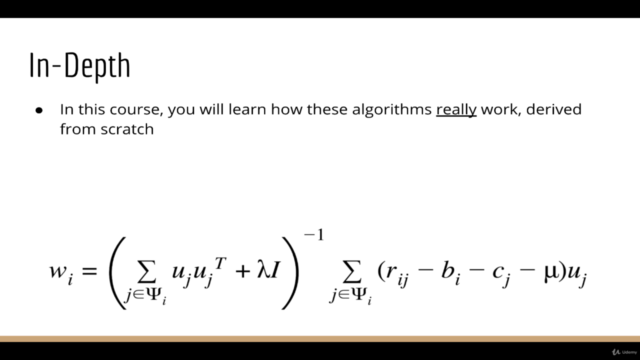Recommender Systems and Deep Learning in Python

Why take this course?
🎓 Course Title: Recommender Systems and Deep Learning in Python
Headline: The Most In-Depth Course on Recommender Systems with Deep Learning, Machine Learning, Data Science, and AI Techniques
What Are Recommender Systems? 🤔
Recommender systems are the unsung heroes of the online world. You might not realize it, but they're at work almost everywhere you go online. From the moment you start searching on Google to the YouTube videos that appear right when you're about to click away, these systems are designed to predict and suggest items you might like, based on your past behavior and preferences.
Why Are They So Important? 🚀
Consider the top three websites by traffic according to Alexa: Google, YouTube, and Facebook. These giants rely heavily on recommender systems to personalize content for billions of users daily. This isn't just a convenience feature; it's a critical business strategy that can significantly influence user engagement and revenue.
What You'll Learn: 📚
- News Feed Algorithms: Dive into the mechanics behind Reddit, Hacker News, and Google PageRank.
- Bayesian Techniques: Understand how media companies leverage these methods to deliver content to their audience.
- E-commerce and Media Recommendations: Discover how Amazon, Netflix, and Spotify use recommendation algorithms to boost sales and viewership.
- Deep Learning Algorithms: Get hands-on with supervised and unsupervised learning using Autoencoders and Restricted Boltzmann Machines (RBMs).
- Big Data Processing: Learn to perform matrix factorization on massive datasets like MovieLens 20 Million, not just the smaller datasets you find in most courses.
Deep Dive into Theory and Practice: 🔍
This course is designed for those who crave a deeper understanding of the algorithms that drive recommender systems. We'll cover state-of-the-art methods such as matrix factorization and delve into the world of deep learning, where you'll implement these concepts from scratch, ensuring you truly understand them.
Implement, Don't Just Plug In: 🖥️
Unlike other courses that teach you to plug in your data into a library, this course encourages you to implement machine learning algorithms from the ground up. You'll write real code and understand each line of it, because as the great physicist Richard Feynman once said, "What I cannot create, I do not understand."
Suggested Prerequisites: 📝
- Basic arithmetic for earlier sections.
- Calculus, linear algebra, and probability for a deeper understanding of the advanced sections.
- Proficiency in Python and the Numpy stack (check out my free course on these topics).
- Knowledge of the basics of using Keras for the deep learning section.
Order Matters: 📖
For newcomers, it's essential to follow a structured path. I recommend checking out the lecture "Machine Learning and AI Prerequisite Roadmap" available in the FAQ of any of my courses, including the free Numpy course, to understand the recommended order to take my courses.
Unique Features: ✨
- Every line of code is explained in detail, so you can be confident in your understanding.
- No time-wasting exercises that aren't practical or useful.
- Embrace complex university-level math for a thorough explanation of algorithms.
Join me on this exciting journey into the world of recommender systems and deep learning. Let's turn abstract concepts into concrete knowledge through hands-on implementation and a deep dive into the mechanics that drive personalized content across the internet. Whether you're a data scientist, an AI enthusiast, or just curious about how these systems work, this course is designed to provide you with the skills and understanding necessary to thrive in today's data-driven world. 🌐✨
Course Gallery




Loading charts...
Comidoc Review
Our Verdict
Recommender Systems and Deep Learning in Python offers a thorough exploration of various recommender system approaches for those with strong mathematical and programming foundations. The course excels in diving deep into complex algorithms while maintaining a clear and engaging delivery. However, there are a few areas that could be improved, such as the availability of code notebooks, pacing adjustments, and enhanced practical guidance for real-world applications.
What We Liked
- Covers a wide range of recommender system approaches with clear explanations and implementations
- In-depth exploration of key algorithms, including matrix factorization, SVD, deep neural networks, and RBMs
- Real-world applicable content, illustrated with big data matrix factorization on Spark with an AWS EC2 cluster
- Provides theoretical explanations for complex topics, making it suitable for those with a mathematical background
Potential Drawbacks
- Some issues with code notebook availability and accessibility for certain users
- Minor concerns about the pacing and tone in some parts of the course
- Lack of real-world job application guidance and comprehensive evaluation metrics coverage
- Occasional gaps in connecting theory to practice, especially in the PageRank section